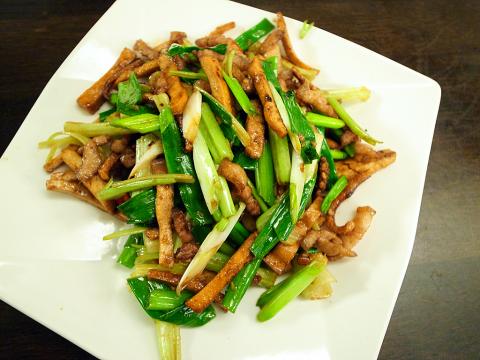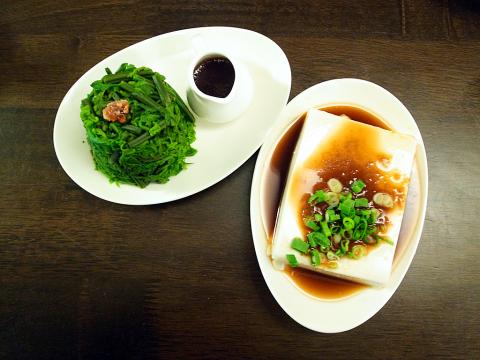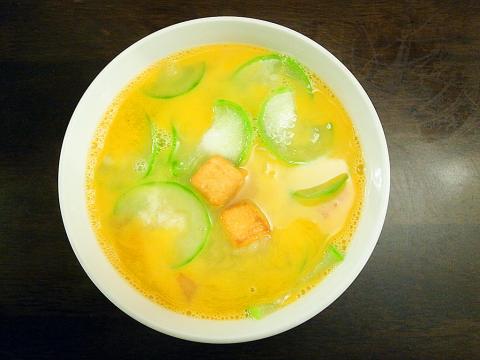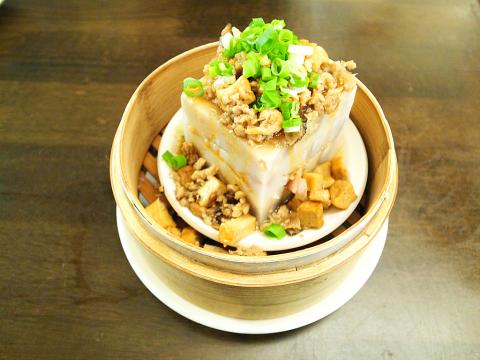Situated down an alley off the busy Heping East Road (和平東路) or Dunhua South Road (敦化南路), depending on where you come from, there is an unassuming restaurant serving authentic Hakka dishes to nearby office workers and local residents. As comfort food, the fare at Liouduei Kitchen conjures up an image of home, where a resourceful mother transforms simple ingredients into rich, flavorful meals on a next-to-nothing budget.
Take Hakka stir-fry (客家小炒, NT$163), a dish indispensable to Hakka cuisine, for example. It is easily cooked, using common ingredients such as bean curd, fatty pork, dried squid and shrimp, red pepper, scallions and celery. But when all these ingredients are put together, they create a rustic zest best paired with a bowl of steaming rice.
Liouduei’s version of this Hakka home-style dish surely hits the spot, properly seasoned, not too salty or oily.

Photo: Ho Yi, Taipei Times
Before diving into the restaurant’s single-page menu, however, diners might want to check out the cabinet next to the counter, which contains a selection of appetizers (NT$40 or NT$60 for each plate). Among them, the guomao (過貓), or vegetable fern, salad with kumquat dressing (桔香涼拌過貓, NT$60) is an interesting combination of the sweet citrus sauce and the mountain vegetable’s slightly sharp taste.
A snack said to originate from Meinong (美濃) in Greater Kaohsiung, the peanut tofu (花生豆腐, NT$67) with garlic and soy sauce comes as a nice surprise. Made from rice and peanuts instead of soybean, the seemingly plain block of soft tofu has the silken texture of tofu pudding (豆花), creamy with a mousse-like consistency. What’s more, the simple starter has many layers of flavor and manages to create a harmony between the garlic’s piquancy and the slightly sweet, nutty flavor of the tofu.
For main dishes, the salty egg and sponge gourd noodles (鹹蛋絲瓜麵線, NT$98) is a revelation. Immersed in a savory broth that is given an alluring golden glow by salty egg yolk, the thin slices of gourd are cooked tender on the inside and remain adequately crisp on the outside. The egg’s sharp taste nicely complements the gourd’s mellowness, punctuated by small chunks of tofu fried with salty yolk.

Photo: Ho Yi, Taipei Times
Less impressive though still adequate is the Hakka steamed taro cake (客式芋頭蒸糕, NT$67) with pork, bean curd, dried shrimps and scallions sprinkled on top.
Other popular dishes include Hakka-style tofu with salty egg (客家金沙豆腐, NT$163), rice noodle soup with taro (芋頭米粉湯, NT$98) and rice bowl with pickled vegetable and salty pork (福菜鹹豬肉拌飯, NT$98). A couple of items I haven’t tried but definitely want to are the Hakka savory glutinous rice balls (客家鹹湯圓, NT$82) and leicha (擂茶) pancake with mochi, or glutinous rice (擂茶麻糬鍋餅, NT$67). Leicha, or pounded tea, is a quasi-essential Hakka drink that mixes grounded and powdered tea leaves, peanuts, sesame seeds, herbs and other ingredients.
Simply decorated, clean and brightly lit, the dining environment is homey. Every time I visit, the service is always good. The Hakka establishment is evidently a popular dining option in the neighborhood as it is often full during rush hours.

Photo: Ho Yi, Taipei Times
For those who work or live outside the area, Liouduei Kitchen recently opened a new branch at B1, 2, Zhongshan N Rd Sec 2, Taipei City (台北市中山北路二段2號B1). Telephone: (02) 2563-6239.

Photo: Ho Yi, Taipei Times

June 2 to June 8 Taiwan’s woodcutters believe that if they see even one speck of red in their cooked rice, no matter how small, an accident is going to happen. Peng Chin-tian (彭錦田) swears that this has proven to be true at every stop during his decades-long career in the logging industry. Along with mining, timber harvesting was once considered the most dangerous profession in Taiwan. Not only were mishaps common during all stages of processing, it was difficult to transport the injured to get medical treatment. Many died during the arduous journey. Peng recounts some of his accidents in

“Why does Taiwan identity decline?”a group of researchers lead by University of Nevada political scientist Austin Wang (王宏恩) asked in a recent paper. After all, it is not difficult to explain the rise in Taiwanese identity after the early 1990s. But no model predicted its decline during the 2016-2018 period, they say. After testing various alternative explanations, Wang et al argue that the fall-off in Taiwanese identity during that period is related to voter hedging based on the performance of the Democratic Progressive Party (DPP). Since the DPP is perceived as the guardian of Taiwan identity, when it performs well,

The Taiwan People’s Party (TPP) on May 18 held a rally in Taichung to mark the anniversary of President William Lai’s (賴清德) inauguration on May 20. The title of the rally could be loosely translated to “May 18 recall fraudulent goods” (518退貨ㄌㄨㄚˋ!). Unlike in English, where the terms are the same, “recall” (退貨) in this context refers to product recalls due to damaged, defective or fraudulent merchandise, not the political recalls (罷免) currently dominating the headlines. I attended the rally to determine if the impression was correct that the TPP under party Chairman Huang Kuo-Chang (黃國昌) had little of a

At Computex 2025, Nvidia CEO Jensen Huang (黃仁勳) urged the government to subsidize AI. “All schools in Taiwan must integrate AI into their curricula,” he declared. A few months earlier, he said, “If I were a student today, I’d immediately start using tools like ChatGPT, Gemini Pro and Grok to learn, write and accelerate my thinking.” Huang sees the AI-bullet train leaving the station. And as one of its drivers, he’s worried about youth not getting on board — bad for their careers, and bad for his workforce. As a semiconductor supply-chain powerhouse and AI hub wannabe, Taiwan is seeing